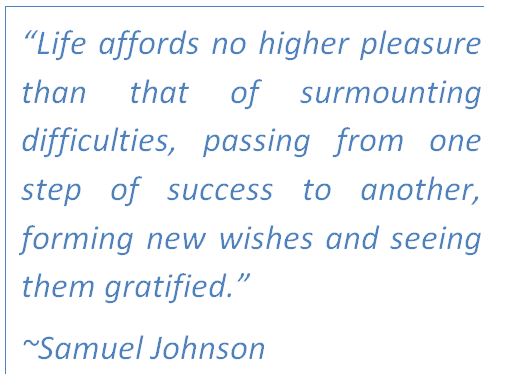Want to go for a double win? Find activities that are both pleasurable AND gratifying.
Research from the field of positive psychology indicates that there are certain actions we can take to increase feelings of happiness and well-being. Happiness in the present moment is based on two distinct concepts: pleasures and gratifications.
The Pleasures
The pleasures are tied to physical and emotional responses. A cool breeze on a hot day, the deep blue of a perfect autumn sky, the burst of flowers in the spring, a beautiful piece of music, Rocky Road ice cream, fresh coffee, a hug from a friend . . . these and many other things of this type bring pleasure. One common characteristic of the pleasures is that they are short lived. A given pleasure may be intense but it fades rapidly once the source is removed. Another characteristic is that we become accustomed to them, meaning it often takes bigger and bigger doses to deliver the same intensity.
Gratification
It is much more difficult to name the underlying feelings in gratification. One reason is that the gratifications are frequently experienced in “flow” – a condition in which we become so immersed in what we are doing that we suspend our consciousness of the world around us, including our emotions. Gratification is not defined by a pleasurable feeling, at least not while we are engaged in the gratifying activity. But according to Dr. Martin Seligman, “father” of positive psychology, the distinction between the two is “the difference between the good life and the pleasant life.” [Seligman]
The gratifications are not necessarily easy or fun during the process. They can require work. They likely require you to get out of your comfort zone. They may involve stress, and – since skill is often involved – the possibility of failure. But gratifications allow – even require – us to identify and use our strengths. And the good feelings of gratification — looking back on a difficult job done well, serving food to homeless people in a soup kitchen, mastering a complex skill — can be savored over and over. They don’t disappear when the activity is finished.
Choose both.
This isn’t to say pleasures don’t have their places in our lives . . . they are important to our happiness. But a life built upon pleasures does not lead to lasting happiness. Interestingly, we often choose pleasure over gratification. It’s easier to sit down in front of the TV than to practice a musical instrument or read a good book. But at what consequence? Are you content to lead a “pleasant life” or do you desire to live a good life . . . an Excelerated Life?
* * * * * * * * * * * * * * * * * * * * * * * * * * * * * * * * * * * * * * * * * * * * * * * * * *
Discovering and using your Signature Strengths is one step in creating your Excelerated life, a life of well-being, meaning, and purpose.
Seligman, Ph.D., Martin E. P. Authentic Happiness. New York: Free Press, 2002


